If you’ve never had a barbecue grill before, you may be a little intimidated by the idea of cleaning and maintaining one of your own.
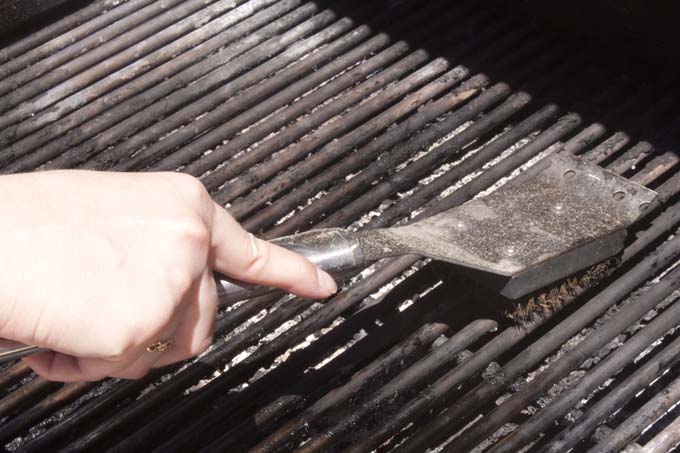
Luckily for you, it really doesn’t take much effort to keep your grill clean and ready to use, and as far as maintenance, there really isn’t much to it.
Whether you have a gas or charcoal barbecue grill, you’ll need to do a little cleaning either right after or immediately before each use, and a more thorough cleaning and maintenance routine once or twice a year.
What some of you may not know is that grease and oil go bad over time, especially in hot weather, so grease or oil left on the grates after cooking will go rancid.
If you try to cook on top of that nasty stuff the next time you grill, your food will taste bad. And more importantly, the old charred and burnt food and sauces may have adverse health effects.
Even if the grates seem clean, grease that has dripped down to the bottom side may be hiding under there. It will vaporize during the cooking process to similarly foul your food.
Besides leftover grease or oil, the grates will be coated with a black, crusty residue. You will want to get rid of this as well. This remainder left over after cooking is mostly carbon, and it will also impart and unwanted flavor your food, not to mention the fact that it may also be carcinogenic.
In addition to these two compelling reasons to get rid of that gunk, it will also keep your meat from coming into direct contact with the grill grates, which means you’ll be left without those aesthetically pleasing grill marks.
Clean Greasy Grates Before Each Use
Now, you know you need to get your barbecue grill spiffed up, and the time to do that is when the grates are nice and hot.
There are two times when this would be the case: either immediately following a use or right before, after your equipment has preheated for about ten minutes or so.
I vote for the latter, and I’ll tell you why:
You’ve just prepared the most amazing-smelling steaks (maybe even of the less traditional, but still amazing-tasting cuts), and you’re actually salivating as you carry the platter to the table. Do you really want to walk away from those babies while your guests get to enjoy the fruits of your labor (while your perfectly cooked steak goes cold) so you can go scrape off the grates while the thing is still hot? I think not!
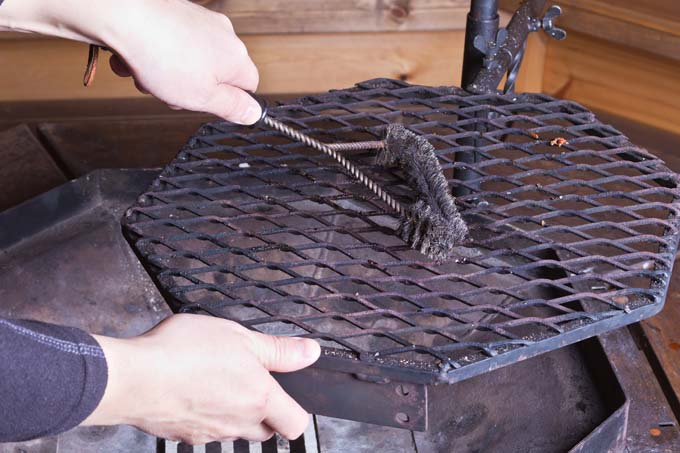
While it may seem a little strange to some to leave a cooking apparatus dirty until the next use, that is exactly what I recommend.
The residue left on the grates will actually help to protect them from rust and other corrosive elements – particularly if you have black steel or cast iron grates.
Porcelain-coated and stainless steel grates, on the other hand, are much more resistant to oxidation and other types of damage from various substances.
Plus, it takes the same amount of time to clean up after you’ve preheated the next time you’re having some people over for a tasty backyard meal, and this way your food won’t get cold.
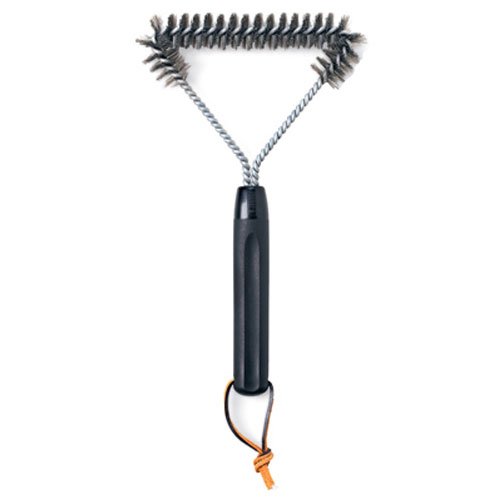
Weber 12-Inch 3-Sided Grill Brush, available on Amazon
The most effective method for cleaning grates before each use is to use some heat, a scraper, and a good quality, stainless steel brush. Add some good old-fashioned elbow great, and within a few minutes, you’ll be good to go.
Grillaholics Essentials Brass Grill Brush, available on Amazon
If you have enameled porcelain-coated grates, then we highly recommend using a brass brush instead of stainless steel. Stainless versions may damage the porcelain.
Here’s the rundown on the cleaning process:
1. Start by turning the heat way up high to get the grate very hot. Close the lid and let the flames burn off the grease for about 10-15 minutes.
2. Once the smoke stops, turn the heat off. Allow it to cool for a few minutes, and then scrape away any carbon residue.
3. Give the grate a scrub with a sturdy stainless steel brush dipped in plain water.
4. Always wipe off your grate with a damp rag or paper towel to pick up any pieces of metal bristle that come off of the brush. Unfortunately, cheaper brass bristle brushes shed quite easily, and many cases have been reported of these bristles being inadvertently consumed and getting stuck in throats and digestive systems.
This process isn’t going to make your grate sparkle, but it will remove all of the carbon and grease that may adversely affect flavors.
Scrub Deflector Plates Monthly
Depending on how often you use your barbecue, you’ll want to clean the deflectors and flavorizer bars at least a couple of times per grilling season. While they are designed to prevent flare-ups, grease can collect and build on these surfaces after several uses, and this may ultimately cause a cookbox fire.
Check your manufacturer’s instructions for cleaning deflector plates, or try this method:
1. Lay a plastic drop cloth on the ground, and lay out the grate and deflector plates.
2. Fill a bucket with hot water and dish soap, and scrub both sides of the grate and plates with a stiff brush or scouring sponge.
3. Rinse thoroughly and allow to air dry, or pat dry with a clean rag or paper towel.
4. For cast iron grates, lightly re-season with vegetable oil after drying.
Cleaning the Interior
The cooking surface and deflector plates aren’t the only parts of the grill that can get dirty. Especially on charcoal models, the interior of the cooking chamber needs to be cleaned as well, but only every so often.
Over time, it will develop a layer of carbon, soot, creosote, and other byproducts of the grilling process and from the various effects of smoke.
Now, a thin coating is no big deal and can actually help to insulate the cooking chamber and keep it nice and hot. You don’t need to worry until the layer becomes thick enough that it starts to curl away from the metal, since pieces may start to flake off onto your food.
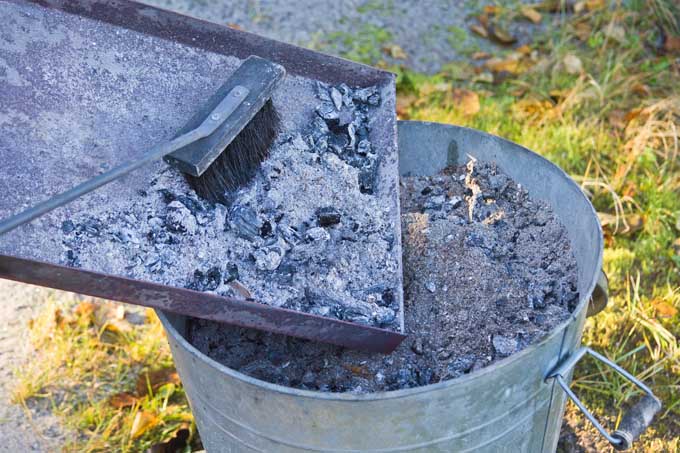
Luckily, this part may be even easier to clean than the cooking surface. All you need is a putty knife to scrape the layer of residue off, and a vacuum to suck up all the pieces when you’re done.
Then, just empty your vacuum into your garbage bucket – the one that you should keep by your grill anyway. It makes it that much easier to get rid of the ash and leftover charcoal after each use that way.
Spring Clean in Late Fall
Once or twice a year, or whenever you prefer to do a thorough cleaning along with the rest of the household, it’s a good idea to really scrub down your grill, inside and out.
Before beginning any extensive cleaning, always check your user’s manual for any special tips or cleaning advice.
Here’s a list of tools and cleaners you might want to have on hand:
- a wide putty knife
- a large tub or bucket
- rubber gloves
- a stiff brush
- a sponge with a textured side
- steel wool
- clean rags or paper towels
- a hose and nozzle, or a pressure washer
- dish soap
- a mild enzyme cleaner, such as Goo Gone All Natural Grill Cleaner
- powdered dishwasher detergent
After removing all of the interior buildup, scrub down everything inside with your grill brush, give everything a good wash with some mild dish soap and a sponge, and then hose the whole thing down.
While you have the sponge and dish soap out, wash the entire exterior as well. If you have a stainless steel model, make sure to use a cleaner specifically intended for stainless, to keep that smudge-free shine.
Please, never use harsh oven cleaners on the interior of your cookbox, grates, or any cooking surfaces. Yes, it will clean well, but the chance of it leaving noxious chemicals behind is too high.
Cleaning a Gas Q
This is going to get messy, so lay out your drop cloth underneath the grill in a spot that can handle a bit of mess.
Here’s what you’re going to do:
1. Check to ensure the LP tank valve is turned off and disconnected from the grill.
2. Remove electric ignitions and lid thermometers, or cover snugly by wrapping in plastic and securing with tape. Remove the grease catch-pan at the same time.
3. Carefully clean any ceramic infrared burners as per the manufacturer’s instructions.
4. Remove and lay your grates and deflectors down in a large tub, add some powdered dishwashing soap, and mix with boiling water. Leave for several hours or overnight. After a good soak, the grate should clean easily with a scrubber sponge or steel wool.
5. Lift any accumulation of carbon soot from the interior of the lid with the putty knife.
6. Scrape the bottom of the cookbox with the putty knife, pushing the debris through the opening for the grease trap. Mop up any remaining debris with paper towels.
7. If the burners come out easily, remove them and wipe down with a damp cloth.
8. Spray the interior of the cookbox and lid with grill cleaner, and clean as per the package instructions. Or, mix 3 tablespoons of powdered dishwasher soap with hot water and scrub the cookbox and lid interior with a stiff brush, or the scrubby side of a sponge.
9. Rinse with a hose and allow to air dry before reassembling. Remember to put in a fresh grease catcher.
10. Clean burner perforations with an awl, a straightened paper clip, or a pipe cleaner.
11. Wash down all exterior surfaces, including grease trays, with warm soapy water. Rinse, and dry with a soft cloth. Use a stainless steel cleaner wherever it’s needed.
Cleaning a Charcoal Q
With charcoal barbecues, having a thin layer of ash on the bottom will actually provide an insulating foundation, which helps with even heating. This means cleaning after each use isn’t necessary.
However, you do need to ensure that any air vents on the bottom are free of ash before each use. And always clean the grates before using, as per the above instructions.
Periodically, remove about three quarters of the ash in the cookbox with a large scoop or a shop vacuum, and dispose of this in the garbage.
A couple of times a year and before storing for the winter, remove all of the ash. Scrub down the interior of the cookbox and lid with warm, soapy water and a stiff brush or textured sponge.
Wash down the exterior at the same time, then rinse the entire unit by hosing it down. Pat dry with paper towels or clean rags.
Get Grilling!
And that’s all there is to it, other than needing to replace the grates occasionally (they will start to warp over time, and when it gets bad enough, you’ll want to get new ones).
If your grill has cast iron grates or some kind of coating on them, they will start to rust or have the coating come off, and these are other indications that replacements are needed.
As I recommend in my accessories article, you should consider investing in a good grill cover. A basic model will run you around $20 and will help to extend the life of your grill by protecting it from moisture, and the rust that inevitably comes with it.
And there you have it, folks. That’s all you need to know about cleaning and maintaining your new favorite cooking apparatus.
Check out more of Foodal’s grilling and barbecuing articles now!
Photo credits: Shutterstock, unless otherwise noted. Written by Ashely Martell with significant revisions and updates by Lorna Kring. Originally posted December 19th, 2014. Revised and updated September 2nd, 2016.
About Ashley Martell
Ashley has enjoyed creative writing since she was six years old, when she wrote her first short story. She majored in English literature at the University of Montevallo. After years of professional work, she is now a stay-at-home mom of three, who uses her craft to write about her life and adventures in and out of the kitchen.

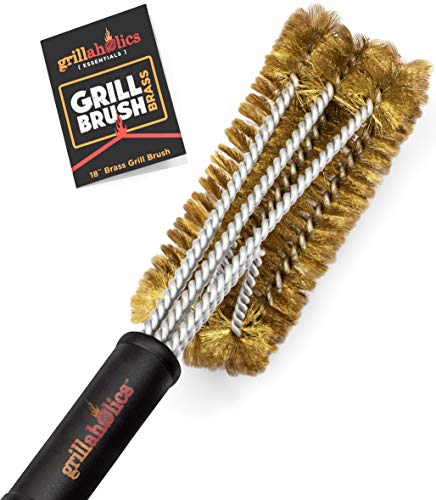
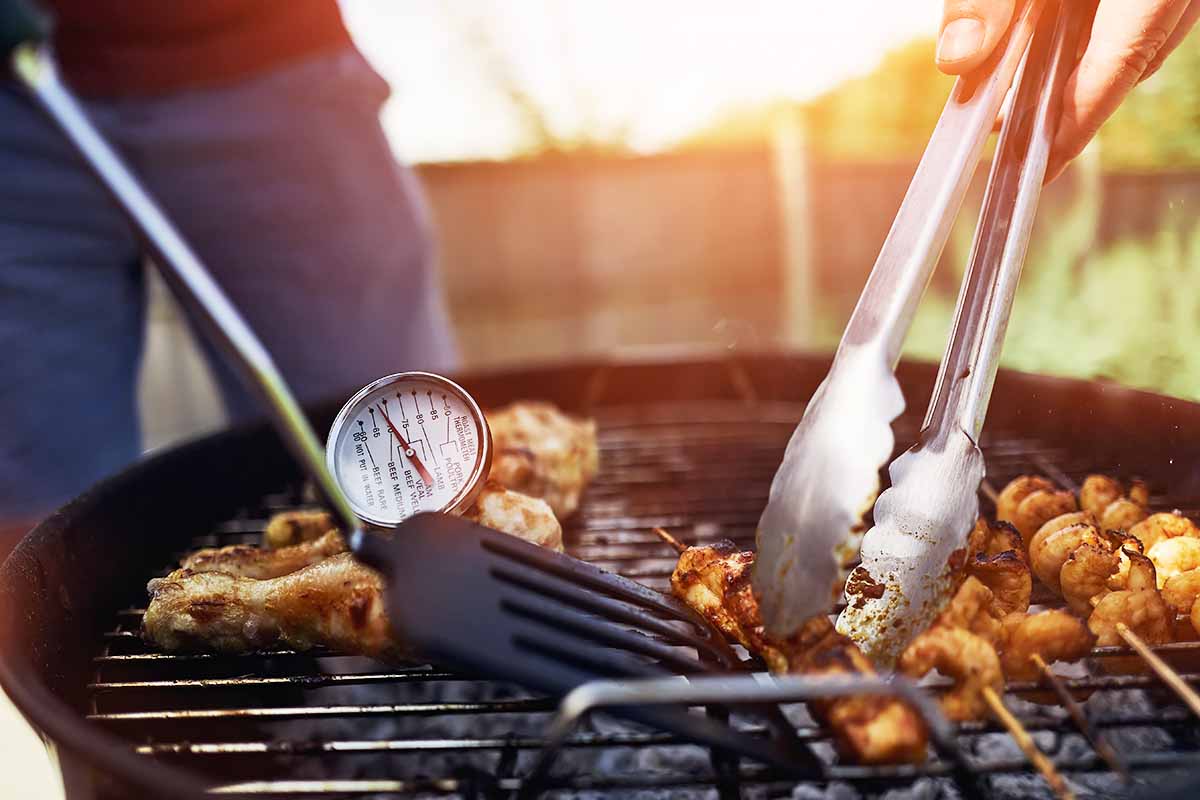
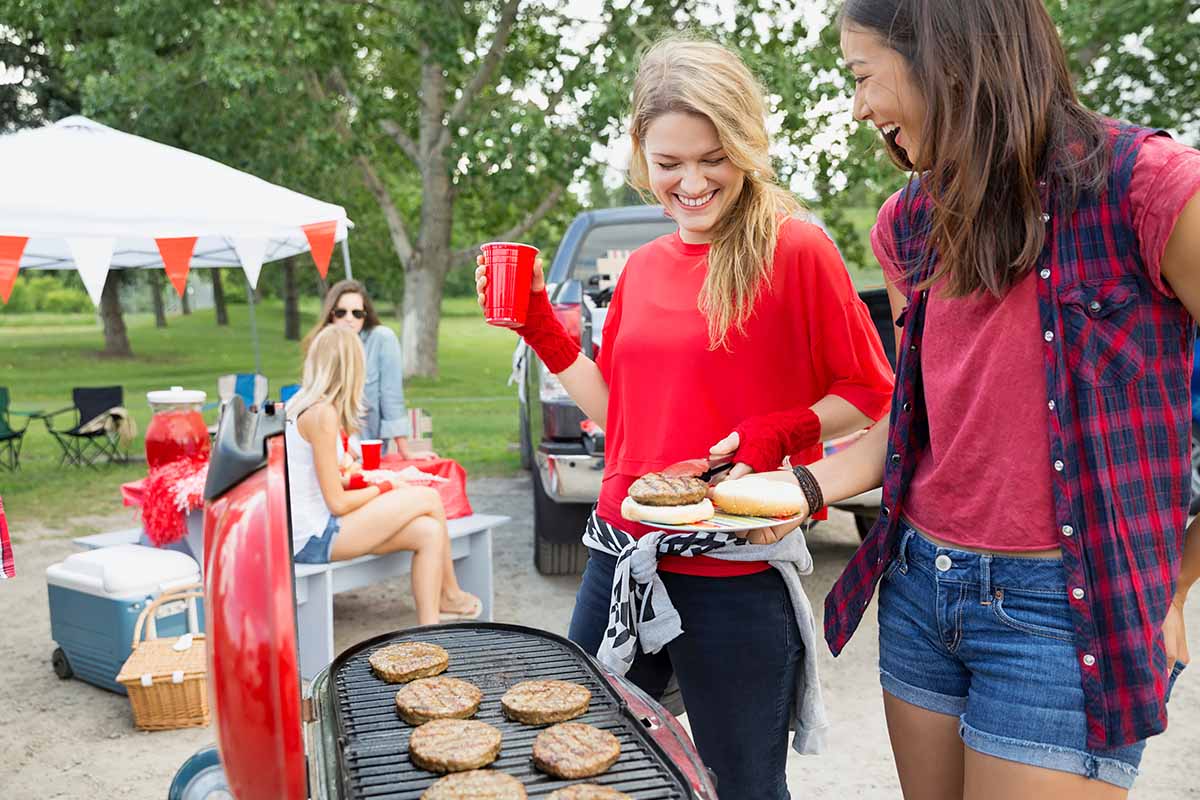

Very interesting. We always leave the grill with the old grease from the food cooked on it until the next time we plan to cook, I thought it was because we are lazy. It is good to know we are not harming the equipment by not cleaning it.
I love to grill, if I could I would barbeque every other day! But hate cleaning it…yuck. But I do sometimes let it just sit, waiting for the next cook out day. Which sometimes doesn’t come soon enough.
I do have some things to clean the grates with but don’t like using them…the cleaners are caustic and sometimes I get carried away with the wire brush and scratch myself.
That being said,I do believe it is time to clean mine. With the weather starting turn warmer (finally) I think it’s time for a cook out!
Perfect timing for me to find this. We are going to be cooking out this evening. I can’t wait. I love grilling, and it’s been a while. I’ll have to show this article to my husband, the “grill master.” I’m really glad he’s also the one that gets to clean the it, lol. Not gonna lie.
He does do a great job preparing the food though, and I get a nice break from cooking.
Unfortunately, I don’t clean ours as often as I should, even though I know better. The author’s right in that grills should be cleaned before or after every use rather than sporadically. The leftover residue and junk causes food to stick, and then it’s not healthy to consume what sticks to the grates and stays there for weeks on end. In fact, I’ll have to clean out mine this weekend because I don’t like thinking about all that buildup.
This article came at a perfect time. My husband was just talking about pulling the BBQ out this weekend and get it cleaned so we can start grilling again. We love bbq in this house but I can’t say cleaning the grill is by any means enjoyable so I usually leave the cleaning to my husband. He usually cleans the BBQ once he’s done eating. I actually like the idea of just leaving it and cleaning it right before the next use, that way I know its perfectly clean just as my food is going on rather than wondering when the last time it got cleaned.
Great post Ashley! A well cleaned Q works so much better than a grimy ol’ one. I gasp when I go to friends for a cookout only to discover a sad grill that’s been neglected.
I am going to share this with my face book friends.
One tip I use when grilling is to put some oil in a spray bottle and give my grill a light spraying before I cook. This prevents the meat from sticking and actually makes clean up a little easier.
Spraying the grill before cooking is a great idea! I do tend to leave the clean up to my brother and will share these tips with him. lol. I definitely don’t like going to friends for a barbecue and finding my meal being cooked on a uncleaned surface…this is not cool, so I will be sharing this article with my friends. Thank you.
I hate having to clean but I love to grill!
I need to get into a routine of cleaning it so that it does not get too gross.
Those are great tips now I just need to put em to use!
Cleaning the BBQ grill is one of the things I dread the most. I never manage get done it properly, even after I look up ways on Google.
You may have just given me a couple of good ideas to try. Hopefully it eases the pain of tidying up the “gear”.
I had a landlord ruin my roommate’s grill one time because he thought you were supposed to extinguish the fire using a hose! He just left the water there too and let it rust. I’ve noticed most people never fully clean their grill, but just the grates. I had never seen an explanation as to why that is necessary, but it makes perfect sense.
Always learning something new on here.
I don’t usually have to worry about cleaning the grill since I do it after I finish cooking on it. I normally let the grates soak in hot water and a little ajax while cleaning out the tub and other components with the same solution. Then I just keep it wrapped in a trash bag to protect it from the elements.
My husband swears by the magic cleaning powers of half an onion! Once the fire has burned down a bit (we get our wood from a local invasive plant removal company), he uses the onion half to scrub the cooking surface. I must admit it seems to do a pretty good job and he’s convinced the meat gets a little onion flavor on the seer marks.
I had no idea that leaving the residue until your next grilling session would protect it from rust. I do leave minel outside and sometimes without a cover. Like you said, it does take time to clean it. I’m thinking of hiring some neighborhood kids for an initial deep scrubbing. Time is money.
Great article as always! Really useful, actually, taking in consideration that we might have overused our barbecue during these summer nights without giving it proper care. Sometimes we believe things are made to stand what they are created for without taking into consideration one must take care of the instruments to make the best use of them. This is specially true for the tools we use for cooking our food, specially meats, since they can get contaminated so easily.
We actually stopped using the grill in my house because we found a dead rat upon it the last time we used it. We bought one of those electrical grills which really get dirty as well. These are some good tips for cleaning it, now I know how to do it properly. Thank you for sharing.
I am with you one hundred percent, and I hate cleaning the grill right after I use it. Sometimes I recognize that it needs to be done, but if I take the time to grill something and I watch it being cooked the whole way, I want to eat it as soon as I can. I do not want to waste time cleaning the nasty stuff off the grill, so it is definitely my preference to do this all beforehand. Good stuff, and thanks for sharing.
It’s actually not that hard to take care of a grill. After I’m done cooking I like to clean it up because I don’t want things to stick in there for a long time, it’ll be harder for me to clean. Other than that I guess always make sure that everything is in order, that the tubes are in good shape and the tools you use are ready, I feel like bbq ustensils are pretty bad quality (I may be buying some crappy ones though).
Great article. I always see articles on buying cooking implements, but caring for them is eve more important. It’s going to be especially important for those of us up north to give our grills a thorough cleaning when we put them away for the summer in a month or so.
I guess this is more my husband’s area of expertise, but I’m quite sure he will appreciate a few tips from me about how to care for his (beloved) grill. I’t’s always great to learn about how to care for your appliances, seeing as how expensive things are these days. Thank you for sharing.